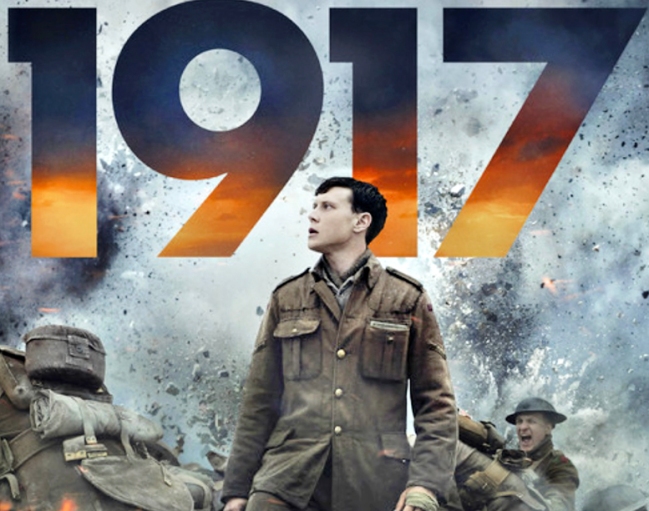 January
17
January
17
Tags
1917 (2019)

If the aim of the blockbuster 1917 (2019) is to produce immersive video-game style entertainment, then it is a stunning success. If it has higher aspirations, such as illuminating World War I history or reminding us of the horrors of war, then it falls short of the mark.
The film draws heavily on the tropes of heroic endeavour and is inspired by a story told to director Sam Mendes by his WWI veteran grandfather. Young British Army corporals Schofield (George MacKay) and Blake (Dean-Charles Chapman) must cross a deadly strip of ‘no man’s land’ carrying an order that will halt 1600 troops from advancing into a German ambush. We know little about the corporals; they are merely avatars for soldiers rather than developed characters with personalities. Their sole purpose in cinematic terms is to act as focal points while the audience follows their mission.
What happens to Schofield and Blake is not as important as how it is filmed. Extended continuous takes are not new, but this film elevates the technique to a higher plane. The camerawork is fixated on the pair through the lens of hyper-realism, with pin-sharp close-ups that show skin pores and fabric fibres. The mission gathers pace with scenes straight out of Dante’s Inferno: they race along snake-like trenches lined with corpses and alive soldiers who look dead. All the time, the camera stays focused on their movements. When they leave the relative safety of trenches, every step is potentially their last. Initially crouching low, they progressively straighten to run, intensifying viewer’s palpable tension in the knowledge that bullets find standing targets more easily.
Dramatic forward propulsion dominates the first half of the film. From mid-point, the pace becomes uneven with scenes that sit oddly in the overall narrative arc. For example, under the noses of a German patrol in hot pursuit, Schofield stumbles upon a young woman and baby hidden in a bombed-out basement; despite immediate threats to himself and the mission, there is time to recite a childhood verse to a gurgling infant. The climactic scenes are perhaps the most discordant. When Schofield eventually reaches the advancing British troops, he finds them sitting like silent grey statues amongst trees listening to a beautiful baritone voice singing a mournful negro spiritual song. Metaphorically imaginative perhaps, but hardly plausible.
Despite the lack of historical authenticity, character development, and consistency of narrative purpose, 1917 is an outstanding example of excellence in cinematography. Like the last war blockbuster Dunkirk (2017), 1917 sets out to be a masterpiece of spectacle and is a success on its own terms.

Director: Sam Mendes
Stars: George MacKay, Dean-Charles Chapman

An interesting review. I haven’t yet seen this one.
LikeLiked by 1 person
I finally had an opportunity to watch this film. Rereading your review, I think you nailed it. I felt very let down by the all too predictable ending and the oddly inserted moments with a cooing baby.
LikeLiked by 1 person
It’s a shame the film was lightweight in terms of character development because it was an immersive experience and would be an education for mid teens.
I loved the filming techniques but was disappointed with my lack of investment regarding the characters.
LikeLiked by 1 person